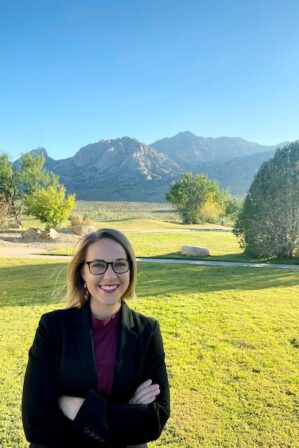To help illustrate where the pursuit of innovation management can lead, our Innovation Pathways series asks our current students, recent graduates, and established alumni to describe their journeys.
 Major Bethany Dumas WG’20 is an active duty Army officer and has served in a variety of leadership roles spanning an 11-year military career. She attended the Wharton School in an active-duty status, graduating with a double major in statistics and business analytics. She recently transitioned to the operations research and systems analysis career field, where she will conduct analytic studies for Army initiatives in her next military assignment. Major Dumas is the recipient of the General Douglas MacArthur Leadership Award and Bronze Star Medal for her service in Operation Enduring Freedom.
Major Bethany Dumas WG’20 is an active duty Army officer and has served in a variety of leadership roles spanning an 11-year military career. She attended the Wharton School in an active-duty status, graduating with a double major in statistics and business analytics. She recently transitioned to the operations research and systems analysis career field, where she will conduct analytic studies for Army initiatives in her next military assignment. Major Dumas is the recipient of the General Douglas MacArthur Leadership Award and Bronze Star Medal for her service in Operation Enduring Freedom.
How did the Mack Institute’s Collaborative Innovation Program (CIP) offer you a learning experience different from other courses you took?
As a second-year MBA student, I viewed the Collaborative Innovation Program (CIP) as my capstone course. It was an opportunity to apply my analytics-based coursework as a statistics and business analytics major to real-world business problems.
After taking several classes at Wharton, I had a working knowledge of machine learning and its ability to shape processes. The business problems prompted me to research other less familiar applications, such as robotic process automation (RPA) and process mining. I learned that slapping new technology at a problem is not effective — organizational processes, systems, and culture vitally impact an initiative’s integration and adoption.
What stands out to you most about CIP?
Exposure and empowerment. As an Army officer, I had limited exposure to the private sector. It was eye-opening to see how a private sector enterprise-level organization fosters innovation and weighs the risks of its implementation. Our team was also encouraged and empowered to seek innovative solutions, and these approaches led to interesting discoveries and unexpected solutions.
What did you find most rewarding about working with your CIP team?
I was blown away by the talent. We had a dynamic team — a data scientist, a founder of an educational startup, a former Amazon PM, and an Army officer. We each approached problems from a different perspective and benefited from the experience of the others on the team. I learned as much, if not more, from my teammates than the project itself.
Did you learn anything from the corporate partner in your project regarding managing innovation that has stuck with you?
Innovation is a recursive and iterative process. It takes a lot of dialogue, reflection, experimentation, and flexibility to arrive at worthwhile solutions. I think there is a tendency to want to jump to a conclusion without first fully framing the problem. But, after much dialogue about processes, systems, and motivations — sometimes after a few rounds of discovery learning — you can begin to find solutions that you or the client may not have expected initially.
Did CIP impact your career goals?
After graduate school, I will return to the Army in a position where I lead/participate in Army studies and simulations pertaining to modernization efforts. This experience helped me develop professional skills I will use in my next position such as problem framing, root cause analysis, developing quantitative and qualitative criteria, communicating concerns, and presenting professional proposals.
I learned that slapping new technology at a problem is not effective — organizational processes, systems, and culture vitally impact an initiative’s integration and adoption.
What advice do you have for current students interested in pursuing careers that involve innovation management?
If you seek a career in innovation management, you must be comfortable with messy, ambiguous problems. You will be a change agent and must identify the linkages in processes and systems to understand the cascading effects and risks resulting from innovation initiatives. Communication is also critical, both for understanding the holistic perspective, but also for asking the right questions, and building buy-in.
So, my advice would be to stay flexible and curious. As you frame the problem(s), aim to fully understand the desired conditions and the current obstacles blocking the achievement of organizational goals. Reimagine and repurpose other industry solutions and remain flexible as the solutions you develop may need to be relooked or tweaked as you learn more about the organization.
Do you think all professionals can benefit today from thinking about or studying innovation management?
As our environment changes at a staggering rate — technologically, politically, even environmentally — it presents opportunities for businesses to relook processes, systems, and products. A continual reassessment of how to foster innovation will build learning and enduring organizations.



